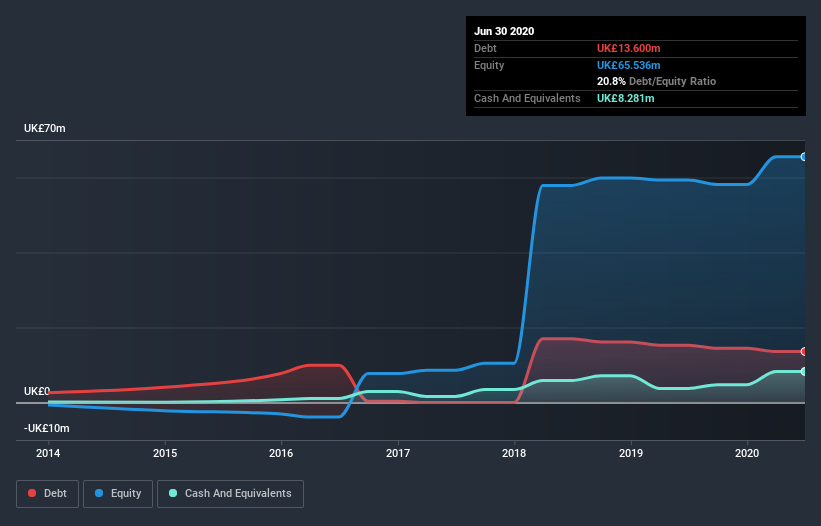- United Kingdom
- /
- Software
- /
- AIM:LOOP
Is LoopUp Group (LON:LOOP) A Risky Investment?
Howard Marks put it nicely when he said that, rather than worrying about share price volatility, 'The possibility of permanent loss is the risk I worry about... and every practical investor I know worries about.' When we think about how risky a company is, we always like to look at its use of debt, since debt overload can lead to ruin. We can see that LoopUp Group plc (LON:LOOP) does use debt in its business. But the real question is whether this debt is making the company risky.
When Is Debt Dangerous?
Debt and other liabilities become risky for a business when it cannot easily fulfill those obligations, either with free cash flow or by raising capital at an attractive price. Ultimately, if the company can't fulfill its legal obligations to repay debt, shareholders could walk away with nothing. However, a more usual (but still expensive) situation is where a company must dilute shareholders at a cheap share price simply to get debt under control. Of course, plenty of companies use debt to fund growth, without any negative consequences. When we think about a company's use of debt, we first look at cash and debt together.
Check out our latest analysis for LoopUp Group
How Much Debt Does LoopUp Group Carry?
You can click the graphic below for the historical numbers, but it shows that LoopUp Group had UK£13.6m of debt in June 2020, down from UK£15.3m, one year before. However, it does have UK£8.28m in cash offsetting this, leading to net debt of about UK£5.32m.

How Healthy Is LoopUp Group's Balance Sheet?
Zooming in on the latest balance sheet data, we can see that LoopUp Group had liabilities of UK£15.1m due within 12 months and liabilities of UK£19.5m due beyond that. On the other hand, it had cash of UK£8.28m and UK£16.7m worth of receivables due within a year. So it has liabilities totalling UK£9.66m more than its cash and near-term receivables, combined.
LoopUp Group has a market capitalization of UK£41.6m, so it could very likely raise cash to ameliorate its balance sheet, if the need arose. However, it is still worthwhile taking a close look at its ability to pay off debt.
We use two main ratios to inform us about debt levels relative to earnings. The first is net debt divided by earnings before interest, tax, depreciation, and amortization (EBITDA), while the second is how many times its earnings before interest and tax (EBIT) covers its interest expense (or its interest cover, for short). Thus we consider debt relative to earnings both with and without depreciation and amortization expenses.
LoopUp Group has net debt of just 0.59 times EBITDA, indicating that it is certainly not a reckless borrower. And this view is supported by the solid interest coverage, with EBIT coming in at 10.0 times the interest expense over the last year. Even more impressive was the fact that LoopUp Group grew its EBIT by 220% over twelve months. If maintained that growth will make the debt even more manageable in the years ahead. The balance sheet is clearly the area to focus on when you are analysing debt. But ultimately the future profitability of the business will decide if LoopUp Group can strengthen its balance sheet over time. So if you want to see what the professionals think, you might find this free report on analyst profit forecasts to be interesting.
Finally, a company can only pay off debt with cold hard cash, not accounting profits. So we clearly need to look at whether that EBIT is leading to corresponding free cash flow. During the last three years, LoopUp Group produced sturdy free cash flow equating to 78% of its EBIT, about what we'd expect. This free cash flow puts the company in a good position to pay down debt, when appropriate.
Our View
LoopUp Group's EBIT growth rate suggests it can handle its debt as easily as Cristiano Ronaldo could score a goal against an under 14's goalkeeper. And that's just the beginning of the good news since its conversion of EBIT to free cash flow is also very heartening. Considering this range of factors, it seems to us that LoopUp Group is quite prudent with its debt, and the risks seem well managed. So the balance sheet looks pretty healthy, to us. The balance sheet is clearly the area to focus on when you are analysing debt. But ultimately, every company can contain risks that exist outside of the balance sheet. To that end, you should learn about the 4 warning signs we've spotted with LoopUp Group (including 1 which is can't be ignored) .
Of course, if you're the type of investor who prefers buying stocks without the burden of debt, then don't hesitate to discover our exclusive list of net cash growth stocks, today.
If you’re looking to trade LoopUp Group, open an account with the lowest-cost* platform trusted by professionals, Interactive Brokers. Their clients from over 200 countries and territories trade stocks, options, futures, forex, bonds and funds worldwide from a single integrated account. Promoted
New: AI Stock Screener & Alerts
Our new AI Stock Screener scans the market every day to uncover opportunities.
• Dividend Powerhouses (3%+ Yield)
• Undervalued Small Caps with Insider Buying
• High growth Tech and AI Companies
Or build your own from over 50 metrics.
This article by Simply Wall St is general in nature. It does not constitute a recommendation to buy or sell any stock, and does not take account of your objectives, or your financial situation. We aim to bring you long-term focused analysis driven by fundamental data. Note that our analysis may not factor in the latest price-sensitive company announcements or qualitative material. Simply Wall St has no position in any stocks mentioned.
*Interactive Brokers Rated Lowest Cost Broker by StockBrokers.com Annual Online Review 2020
Have feedback on this article? Concerned about the content? Get in touch with us directly. Alternatively, email editorial-team@simplywallst.com.
About AIM:LOOP
LoopUp Group
Provides cloud communications platform for business-critical external and specialist communications in the United Kingdom, the European Union, North America, and internationally.
Good value with mediocre balance sheet.
Similar Companies
Market Insights
Weekly Picks


Is Ubisoft the Market’s Biggest Pricing Error? Why Forensic Value Points to €33 Per Share


EU#4 - Turning Heritage into the World’s Strongest Luxury Empire


The "Easy Money" Is Gone: Why Alphabet Is Now a "Show Me" Story
Recently Updated Narratives

Great dividend but share numbers have increased 100% in last 12 months!!

Proximus: The State-Backed Backup Plan with 7% Gross Yield and 15% Currency Upside.


SEGRO's Revenue to Rise 14.7% Amidst Optimistic Growth Plans
Popular Narratives


The "Sleeping Giant" Stumbles, Then Wakes Up

Undervalued Key Player in Magnets/Rare Earth


NVDA: Expanding AI Demand Will Drive Major Data Center Investments Through 2026
Trending Discussion







